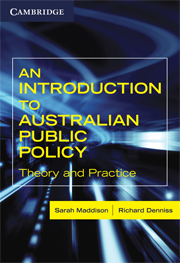Book contents
- Frontmatter
- Contents
- List of figures
- List of tables
- List of case studies exercises, and original contributions
- Foreword
- PART 1 Policy and theory
- Introduction
- 1 The australian policy context
- 2 State or market I: Ideology and public policy
- 3 State or market II: The economics of public policy
- 4 Models and theory for understanding policy
- 5 Policy actors and policy instruments
- 6 Identifying issues: Agenda setting and policy discourse
- PART 2 Policy in practice
- References
- Index
- References
6 - Identifying issues: Agenda setting and policy discourse
- Frontmatter
- Contents
- List of figures
- List of tables
- List of case studies exercises, and original contributions
- Foreword
- PART 1 Policy and theory
- Introduction
- 1 The australian policy context
- 2 State or market I: Ideology and public policy
- 3 State or market II: The economics of public policy
- 4 Models and theory for understanding policy
- 5 Policy actors and policy instruments
- 6 Identifying issues: Agenda setting and policy discourse
- PART 2 Policy in practice
- References
- Index
- References
Summary
Introduction
It would be comforting to think that policy is made by wise and omniscient ministers, advised by well-informed staff responding to commonly understood social problems. From the lofty heights of parliament, ministers would maintain a comprehensive overview of their portfolio, ever alert and responsive to problems as they arise, while developing equitable and efficient policy solutions for the good of all of society. The reality, of course, is somewhat different. Like all areas of policy work, determining which issues should receive government attention is fraught, competitive and often highly conflictual.
How and why issues become policy problems is another complex area of policy studies. One way in which this process is understood is closely aligned with the understanding of policy work as authoritative choice. In this view the transition from problem to policy occurs during the stage in the policy process known as issue identification or agenda setting. A different way of understanding how issues become problems worthy of a policy response sees policy development as a process of social construction. This view acknowledges that policy workers bring their own values to the policy process, which influences their views about what is valid and relevant and what should command the attention of governments. Policy work in this sense is understood as being concerned with the construction of meaning (Colebatch 2006: 8–9).
Both of these frameworks recognise the inherently political nature of determining what issues governments take up and the sort of policy responses they develop.
- Type
- Chapter
- Information
- An Introduction to Australian Public PolicyTheory and Practice, pp. 124 - 140Publisher: Cambridge University PressPrint publication year: 2009



